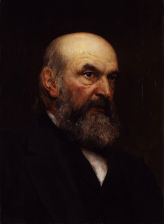
St John’s College has a welcoming and well-established mathematical community. We currently have five Teaching Fellows, a number of Research Fellows and four Professors. Every year we are joined by around fifteen undergraduates who come to St John’s to read Mathematics. Any Johnian mathematician automatically becomes a member of the Adams Society!
You can find out more about the mathematics course at the St John’s website, including an overview of the course, entry requirements and student views.

St John’s has a rich history in mathematics. Our society is named after Johnian John Couch Adams (1819-1892), who was senior wrangler in 1843. John Couch Adams predicted the existence and position of the planet Neptune using nothing but mathematics: he considered discrepancies with the orbit of Uranus and used Kepler’s and Newton’s laws of planetary motion and gravitation. He held the Lowndean chair of Astronomy and Geometry in Cambridge for 33 years and won the Gold Medal of the Royal Astronomical Society. The Adams Prize, a prestigous University Mathematics Prize, is named in his honour.
There is a long list of other famous Johnian mathematicians:
And there are certainly many more to come in the future!
